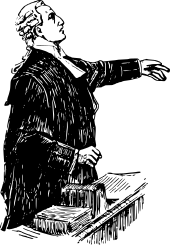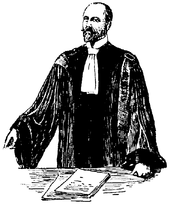Lawyer
![]()
This article or paragraph presents the situation in Germany. Help describe the situation in other countries.
Rechtsanwalt ( ![]() ) (in Switzerland, depending on the canton, also called Advokat, Fürsprecher and Fürsprech; from germ. rehta, Old High German reht: "richten", anawalt: "violence") is a professional title for a legal adviser (lawyer). Together with patent attorneys, tax advisors and auditors and (partly) notaries, he belongs to the liberal professions providing legal and economic advice. All questions concerning the profession of lawyer are dealt with - since 1988 in Germany also institutionally - by the law governing lawyers. One speaks of a "titular lawyer" in the case of admitted lawyers who do not take on any mandates. They often use the professional title for image reasons or in order to be able to become a member of a lawyers' pension scheme and acquire pension rights there. In addition, Section 17(2) of the Federal Lawyers' Act (Bundesrechtsanwaltsordnung, BRAO) allows the competent Bar Association to grant permission to a lawyer who renounces his admission due to old age or infirmity to continue to call himself a lawyer.
) (in Switzerland, depending on the canton, also called Advokat, Fürsprecher and Fürsprech; from germ. rehta, Old High German reht: "richten", anawalt: "violence") is a professional title for a legal adviser (lawyer). Together with patent attorneys, tax advisors and auditors and (partly) notaries, he belongs to the liberal professions providing legal and economic advice. All questions concerning the profession of lawyer are dealt with - since 1988 in Germany also institutionally - by the law governing lawyers. One speaks of a "titular lawyer" in the case of admitted lawyers who do not take on any mandates. They often use the professional title for image reasons or in order to be able to become a member of a lawyers' pension scheme and acquire pension rights there. In addition, Section 17(2) of the Federal Lawyers' Act (Bundesrechtsanwaltsordnung, BRAO) allows the competent Bar Association to grant permission to a lawyer who renounces his admission due to old age or infirmity to continue to call himself a lawyer.

The Procurator from Jost Amman's Book of Estates (1568)
.jpg)
Lawyers as seen by Honoré Daumier
History
In ancient Athens, a litigant had to plead his case in court with two pleadings. A friend or relative was allowed to support one of these parties as an "advocate" or synegor (ancient Greek συνήγορος synēgoros). Those who sought professional help could describe their case to a logographer. The logographer would then compose a speech, which the litigant would memorize and recite in court. The logographers differed from the synegors in that their task was limited to writing the plea and they worked for pay, which was forbidden to the synegors. Lawyers in the modern sense did not exist. Rhetoric was of outstanding importance in the democratic Athens of the fourth century B.C., especially in the popular assembly and in the courts, which were staffed by lay judges chosen by lot. Teachers of rhetoric were numerous, and manuals of rhetoric began to appear. The Greek philosopher Aristotle distinguished rhetoric into three genres:
- Judicial speech (gr. γένος δικανικόν (génos dikanikón), lat. genus iudiciale).
- Deliberative speech; political decision speech (Gr. γένος συμβουλευτικόν (génos symbouleutikón), Lat. genus deliberativum).
- Eulogy and festive speech (Gr. γένος ἐπιδεικτικόν (génos epideiktikón), Lat. genus demonstrativum or genus laudativum).
He defined rhetoric as "the ability to consider what is possibly persuasive (pithanon) in any matter". Aristotle already criticized contemporary teachers of rhetoric for neglecting argumentation and aiming exclusively at arousing emotions, for example through behaviors such as whining or bringing the family to the court hearing, which prevented the judges from making a factual judgment. An impressive testimony to how rhetoric and legal arguments could also interact, however, can be found in the speeches of Demosthenes and Aeschines in the trial report on On the Wreath of Honor.
Since it was not everyone's cup of tea to find the right words in court, professional orators were later allowed to speak in court, but their knowledge of the law was of secondary importance. Rather, they only had to master the art of rhetoric in general to influence the judge's decision.
The Roman Emperor Augustus granted individual jurists the right to issue legal opinions or responses. It can be assumed that these opinions, which were endowed with the highest consecration, had the character of a judgement and that the corresponding jurists therefore had a very great almost legislative competence. For the first time, lawyers became a recognized and protected, state-controlled, socially uniformly organized professional group. Previously free from this as mere private individuals, the Princeps could now intervene and regulate. In jury courts, before which every citizen could accuse with the popular complaint, the accused was allowed to have Advocati (similar to lawyers but not advocates) appear for him. As a field of activity, besides the assessors in court (Assessores) and the activity of the responding lawyer, the activity of the orator in court came into consideration. These Advocati were probably of a different quality than the pure Respondierjuristen. While the latter were certainly theorists and specialists, the advocati were often quite pragmatic defenders of their client. Often they were merely trained orators with, again, legal advice on their part or rather little legal education. These were called not only advocati, but also togati (toga-clad), because they had to wear the ancient garment of the toga in late Roman times. Whether they were orators or had a professional education can only be conjectured. A decree of the emperor Leo from the year 460 A.D. decreed an education as a lawyer as a prerequisite for such activities, but apparently referred only to the highest court.
Little is known about the historical beginnings of the legal profession in Germany.
Sachsenspiegel, Schwabenspiegel
Some of this can be gleaned from the Sachsenspiegel. This was written around 1220-1233 by Eike von Repgow. Eike von Repgow emphasizes that the Saxons were able to enforce some regulations against Charlemagne's right of occupation. Therefore, many regulations of the Sachsenspiegel were not only valid since 800, but also in the pre-Christian centuries. Scattered throughout the Landrecht of the Sachsenspiegel are some regulations that reveal the Germanic roots of lawyerly activity. These are the Vorspreke. In some Swiss cantons, the professional title of advocate has survived. Originally, however, it was not so much a matter of interceding on behalf of another person as of advocating on his or her behalf. Procedural formalities had similar, if not greater, importance then than they do today. Every free man had the right to plead his own cause in court. If he misspoke, the error was irremediable. Therefore, there was the option of having another speak instead of himself. The advocate had to be male. He was not allowed to be a clergyman, legally incompetent, incapable to stand trial, or in imperial suspicion. The judge was obliged to ask the party whether he wanted to accept the words of his advocate against him. The party could confirm, deny or ask for time to consider. If a party did not confirm the words of his advocate, they were not to be considered. Every man of judicial capacity was obliged to accept the office of advocate if the judge appointed him to do so. Exceptions applied to designated cases of conflict of interest. In the case of sexual offences, the judge had to provide for a guardian of the injured party to represent her in court if no member of her clan was available.
The Sachsenspiegel does not explicitly state that there were people at that time who regularly acted as intercessors and received money for it. But there are two indications for it. If both parties wanted the same man as their advocate, the decision lay with the judge. Either the advocate had to be known to the court or be wealthy, or he had to furnish the judge with sureties for the fines that might be imposed on him personally before he was allowed to act. Even with family ties, it seems doubtful that one would want to be liable for another's lawsuit themselves. This risk of liability will have been adequately paid for by the advocate.
In Art. 87 of the Schwabenspiegel, essential points of the lawyer's professional law had already been regulated since the late Middle Ages. The advocate was only supposed to represent the one who, according to his conviction, was right. If he helped his party in a case of fraud, he had to pay high penalties personally to the judge and the aggrieved party. The judge could order the advocate to represent a poor party free of charge. Finally, the lawyer's duty of confidentiality and the prohibition of representing conflicting interests were already known.
Modern Times
With the reception of Roman law in Europe from the High Middle Ages onwards, court proceedings were professionalised and functions were created that were filled by trained lawyers. In this process, a profession of professional lawyers emerged who represented a party in the trial before the court, the so-called procurators. In addition, there were other lawyers who maintained contact with those seeking justice, advised clients and also provided them with legal assistance in extrajudicial transactions, the so-called advocates. The advocates prepared the legal case legally and provided the procurator with the written preparation. However, this separation between advocates and procurators existed in some countries only in the highest courts.
In Germany, this division was known in the southern German territories, which had originally been under Roman administration. In the land law of the Schwabenspiegel, which was first recorded around 1275, a distinction was made between the advocate, who represented in court, and the counselor. Both could demand money for their work. In the case of the advocate, there was a prohibition on agreeing a contingency fee, similar to today. However, he could demand separate reimbursement of his travel expenses. In contrast, the advisor was not paid for bad advice and was liable for any resulting damage. This is probably the origin of the saying "Good advice is expensive". Since the regulations of the Sachsenspiegel and the Schwabenspiegel that followed it applied to court proceedings held by the king himself or under the king's ban, the division of the lawyer's duties was later limited to proceedings before the Imperial Court or the Imperial Chamber Court.
Since the end of the 16th century, the dichotomy of the legal profession in continental Europe was increasingly loosened and largely eliminated with the legal reforms of the Napoleonic period, so that in the course of the 19th century the professional image of a uniformly active lawyer emerged. Initially, in Prussia during the reign of King Frederick II, advocates became state officials as "court and assistant councillors". From 1780 onwards, "judicial commissioners" were introduced for the areas of voluntary jurisdiction, execution and bankruptcy and for the notarial system. In 1793 Prussia abolished the assistant councils and in 1849 linguistically transformed the judicial commissioners into "lawyers" who initially remained state officials until the Lawyers' Act (RAO) of 1878 made the legal profession a free profession independent of the state. The 20th century was characterized by an increasing specialization of the legal profession, which continued in the 21st century with the introduction of further specializations.
The two-tier system still exists today in Spain, where the traditional terms "advocate" (abogado) and "procurator" (procurador) persist, as well as in the legal systems of England, Wales and other Commonwealth countries, which are influenced by the common law tradition, where the procurators in litigation are called "barristers" and the non-judicial advocates "solicitors".

Lysias (c. * 445 - † 380 BC), famous Greek logographer.

English barrister in robe (around 1900)

French lawyer in Robe (around 1910)
Tasks
Lawyers have the task of helping their client to obtain justice by constitutional means. To this end, they may advise or represent anyone, unless they have previously advised or represented the opposing party in the same matter or other prohibitions on representation exist - e.g. prior activity as a notary or mediator which obliges neutrality. The representation of interests on behalf of a party is the characteristic of the profession of lawyer.
During the consultation, the client is informed about the legal situation, his chances of success, the possibilities of preserving evidence and the costs incurred as well as the cost risk.
Anyone can be represented by a lawyer in any proceedings before authorities or courts. In criminal proceedings or proceedings for the payment of fines, the lawyer acts as defence counsel. In civil proceedings, there is an obligation to be represented by a lawyer at the Regional Courts, Higher Regional Courts and the Federal Supreme Court. The same applies to the higher instances in other types of proceedings. The purpose of this so-called obligation to be represented by a lawyer is to relieve the higher instances of the jurisdiction, since fact-finding work and preliminary legal assessments are to be carried out by the lawyers before the action is filed and during the proceedings.
The Legal Services Act (Rechtsdienstleistungsgesetz), which came into force on 1 July 2008, replaced the Legal Advice Act (Rechtsberatungsgesetz) which had been in force until then. Extrajudicial legal advice has been opened up to a greater extent to non-lawyers. For the core area of legal services, i.e. primarily representation in court, the lawyer monopoly essentially continues to apply.
The Federal Lawyers' Act (BRAO) does not exhaustively list the general tasks of the lawyer. Section 1 of the BRAO defines the lawyer as an "independent organ of the administration of justice". Section 3 BRAO states: "The lawyer is the independent adviser and representative in all legal matters." More specifically, §§ 48, 49 and 49a BRAO mention the duties to represent in civil proceedings under certain conditions, to provide public defence and to provide legal advice. The Professional Code of Conduct for Lawyers (BORA) states the following duties of the lawyer in § 1 (3): "... to protect his clients from loss of rights, to assist in shaping the law, avoiding conflicts and settling disputes, to protect against wrong decisions by the courts and authorities and to safeguard against unconstitutional interference and excess of state power." The independence of lawyers and protection against unjustified persecution for the lawful practice of their profession is also secured by international standards, such as the Council of Europe Recommendation on the Free Exercise of the Legal Profession or the UN Basic Principles concerning the Role of Lawyers.
In Austria, the Lawyers' Act (RAO) regulates the professional profile of lawyers. Among other things, the law lays down the requirements for practising the profession and the expiry of this entitlement, as well as the rights and duties of lawyers. Furthermore, there are regulations on the bar association, which represents the interests of Austrian lawyers as a corporation under public law. The Bar is also responsible for protecting the reputation of the profession and for initiating disciplinary proceedings against lawyers.
In the abstract, the meaning and tasks of the lawyer's activity can be broken down as follows:
- Legal drafting (more complicated legal transactions that are important for the economy would often be omitted without the help of lawyers in drafting contracts. On the other hand, the involvement of lawyers by ministries for the preparation of draft laws is controversial).
- Clarify claims and counterclaims to litigants and preserve evidence
- extrajudicial enforcement of claims (by means of letters of demand from lawyers, contractual penalties). Contractual penalties and the obligation of the defendant to bear the costs also contribute to the prevention of future legal infringements.
- Relieving the burden on the judiciary by advising against bringing an action if there is no prospect of success (filter function for the courts), out-of-court dispute resolution by concluding out-of-court settlements (thus also contributing to legal peace), mediation (in these cases the lawyer acts as a mediator and not as the representative of a party)
- to provide procedural assistance for the proceedings before the courts (clarification of the facts and arrangement of the submissions, legal arguments)
- Checking the legality of the case law of lower courts, if necessary with the consequence of lodging an appeal
- to perform procedural acts (for example: to raise pleas, to enter into settlements, to appeal)
- to contribute to the further development of legal interpretation, in particular of case law, and to legislation through participation in professional organisations, contributions to professional journals or commentaries.
According to rough estimates, 80% of the work carried out by lawyers on behalf of clients consists of clarifying the facts of the case and 20% of the subsequent application of the law.
Questions and Answers
Q: What is a lawyer?
A: A lawyer is someone who practices law and has earned a degree in law and has a license to practice law in a particular area.
Q: What do people contact lawyers for?
A: People contact lawyers for advice regarding any legal problems they may have.
Q: What does it mean when a case goes to court?
A: When a case goes to court, the lawyer will represent their client in court and use their knowledge of the law to convince the court that the client is on the right side of the argument.
Q: How can lawyers help people resolve disputes without going to trial?
A: Lawyers can help people "settle out of court," which means that both sides of an argument agree to resolve the dispute ahead of time so that they will not have to go to trial.
Q: Who pays for defense lawyers if someone cannot afford them?
A: In many countries, if a person is accused of a crime and unable to pay for a lawyer, the government will pay for one using tax money.
Q: What type of legal documents do lawyers prepare for clients?
A: Lawyers prepare legal documents such as buying or selling property or making wills (testaments).
Q: Where do some lawyers work?
A: Some lawyers work by themselves while others work in law firms or hospitals and private companies. Lawyers who work for private companies are usually called in-house counsel.
Search within the encyclopedia